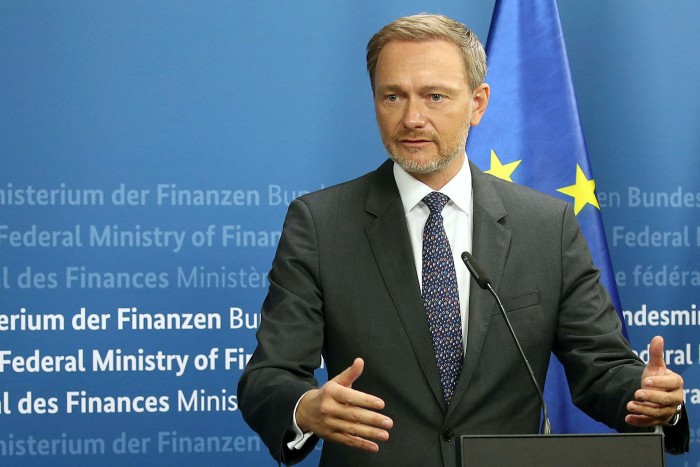Germany fears Russia could retaliate against western sanctions in the event of war with Ukraine by cutting off gas supplies, its finance minister has said, a move that could cripple Europe’s largest economy.
Christian Lindner told the Financial Times that Russia had always been a reliable supplier of natural gas to Germany, even at the height of the cold war. But that could change if Russia invaded Ukraine and the west punished Moscow with a swingeing sanctions package.
“If you look at the cold war, whatever happened between Nato and the Warsaw Pact, there was never a situation where political tensions harmed co-operation in the energy sector,” Lindner said. “Things might be different now.”
The US said this week that Russia could be poised to invade Ukraine within several days, after massing an estimated 150,000 troops on the Ukrainian border.
The west has warned Russian president Vladimir Putin of grave economic consequences if he attacks his western neighbour. Germany has made clear these would include a halt to the Nord Stream 2 pipeline bringing Russian gas directly to Europe under the Baltic Sea.
Some fear the Kremlin could respond to sanctions by reducing or even stopping gas flows to Europe, which relies on Russia for 40 per cent of its gas. Lindner’s remarks suggest such a scenario is being taken seriously in Berlin.

The growing tensions over Ukraine have coincided with a surge in European gas prices, amid lower-than-expected deliveries from Russia and rising demand from economies emerging from the Covid-19 pandemic.
Some experts believe Russia held back supplies to the spot market and deliberately depleted its gas storage facilities in Europe ahead of winter demand, driving stockpiles to their lowest seasonal level in more than a decade.
“Gazprom, a Russian state-owned company, is deliberately trying to store and deliver as little as possible,” Ursula von der Leyen, European Commission president, told the Munich Security Conference on Saturday. “While prices and demand are skyrocketing, this is very strange behaviour for a company.”
Such developments have persuaded many in Berlin that Russia is prepared to use its energy exports to exert pressure on the west, regardless of the damage that might do to its reputation as a reliable supplier.
The EU has said it would be able to cope with a partial cut-off of gas and has spoken with the US, Qatar, Egypt, Azerbaijan and other countries about increasing deliveries of liquefied natural gas (LNG), either through additional shipments or contract swaps.
Lindner insisted Germany had made adequate contingency plans to source alternative supplies of gas should Russia turn off the tap. But he added that the current crisis underscored the need for Germany to diversify its energy imports, in particular by procuring more LNG.
“I’m very much in favour of Germany building LNG terminals, and have been for years,” he told the FT. “If we get LNG terminals built then that would be a positive outcome of this situation.”
FDP leader supports return to normalised monetary policy
In the interview, Lindner — leader of the liberal Free Democratic party, which is traditionally hawkish on public spending — also intervened in the debate about the future of the EU’s fiscal rules, known as the Stability and Growth Pact (SGP). The rules, which cap budget deficits at 3 per cent of gross domestic product and try to limit public debt to 60 per cent of GDP, have been shelved since the start of the pandemic but will come back into force from 2023.
The European Commission is working on proposals for reforming the SGP and some EU countries, particularly in the south, would like to see investments in green and digital projects “carved out” of deficit calculations — an approach described as the “golden rule”.
Lindner rejected that. “I don’t support the idea of a golden rule,” he said. “Everyone would end up having their own definition for investment.”
“For the financial markets, debt is debt,” he continued. “It doesn’t matter if it’s debt in the pension system or debt for public sector investment.” The priority for the eurozone was, he said, “to have a clear path to lower debt levels”.
Lindner’s conservative fiscal views have had a marked impact on the policies adopted by the three-party coalition government, which brings together his FDP with the Greens and Social Democrats. Under FDP pressure, the government has eschewed tax rises and pledged to stick to the debt brake, Germany’s constitutional curb on new borrowing, which was suspended during the pandemic but is due to come back into force in 2023.
Lindner was critical of the European Central Bank’s ultra-loose monetary policy, saying there was a risk of “fiscal dominance” — a situation where government debt has risen so high that a central bank may be reluctant to raise interest rates to tackle high inflation. It was a danger highlighted by Jens Weidmann last month as he bowed out as president of Germany’s Bundesbank, and has also been raised by his successor Joachim Nagel.
“With the ECB’s policies and bond purchase programmes and very low interest rates, there is the danger of fiscal dominance,” said Lindner. “That’s why we are in favour of returning to crystal-clear fiscal rules, both in Germany and the eurozone.”
Lindner said he could “understand” why the ECB had decided to gradually reduce its asset purchases if inflation remained high, noting that some eurozone central bankers, such as Nagel and Klaas Knot of the Netherlands, were talking about the need to raise interest rates. “I would certainly support a return to normalised monetary policy,” he added.

